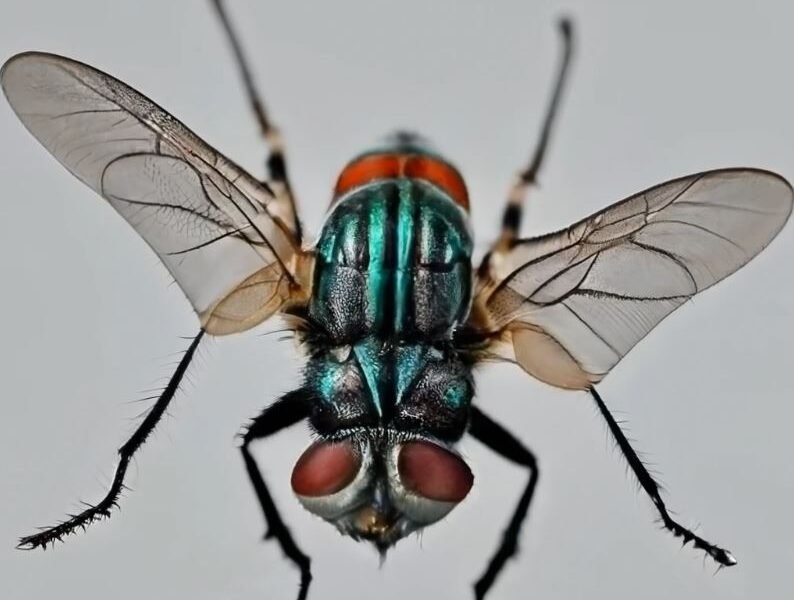Introduction: Bluebottle flies, also known as blow flies, are common household pests that can quickly become a nuisance when they infest homes. These flies are attracted to decaying organic matter, such as food waste, animal carcasses, and compost, where they lay their eggs and breed. Bluebottle flies can carry disease-causing bacteria and are known to contaminate food and surfaces with their feces and regurgitated fluids. In this comprehensive guide, we’ll explore various strategies and techniques for keeping bluebottle flies away from your house, ensuring a clean and sanitary living environment for you and your family.
Understanding Bluebottle Fly Behavior: Before implementing control measures, it’s essential to understand the behavior and habits of bluebottle flies. These flies are attracted to odors emanating from decomposing organic matter, which they use as breeding sites for their eggs. Female bluebottle flies lay their eggs in moist, decaying material, such as rotting food, animal feces, or decaying plant matter. The eggs hatch into larvae, commonly known as maggots, which feed on the decaying matter before pupating and emerging as adult flies.
- Proper Waste Management: Proper waste management is crucial for preventing bluebottle fly infestations. Ensure that garbage bins are securely sealed with tight-fitting lids to prevent flies from accessing food waste and other organic matter. Regularly empty and clean garbage bins to remove any accumulated debris or residue that may attract flies. Dispose of food waste promptly and avoid leaving uncovered food scraps or leftovers exposed in the kitchen or outdoor eating areas.
- Maintain Cleanliness Indoors and Outdoors: Maintaining cleanliness indoors and outdoors is essential for deterring bluebottle flies. Clean up spills and crumbs promptly, and store food in airtight containers to prevent flies from accessing potential food sources. Wipe down kitchen surfaces, countertops, and appliances regularly to remove food residue and odors that may attract flies. Keep outdoor areas clean and free of debris, including pet waste, fallen fruit, and compost piles, which can serve as breeding sites for flies.
- Seal Entry Points: Preventing flies from entering your home is key to keeping them away. Inspect doors, windows, vents, and other potential entry points for gaps, cracks, or openings that flies could use to gain access. Seal any gaps or holes with caulk or weatherstripping to prevent flies from infiltrating your living space. Install screens on windows and doors to keep flies and other flying insects out while allowing for ventilation.
- Use Fly Screens and Traps: Fly screens can be installed on windows, doors, and vents to prevent flies from entering your home while still allowing air to circulate. These screens are made of fine mesh that blocks flies and other insects from passing through. Additionally, fly traps can be placed indoors and outdoors to capture adult flies. Sticky fly traps or electric fly zappers are effective options for reducing fly populations and preventing infestations.
- Employ Natural Repellents: Several natural ingredients can act as effective repellents against bluebottle flies. Essential oils such as citronella, eucalyptus, peppermint, and lavender are known for their insect-repelling properties and can be diluted with water and sprayed around the perimeter of your home to deter flies. Planting insect-repellent herbs and flowers, such as basil, mint, marigolds, and lavender, in your garden or near entry points can also help keep flies at bay.
Conclusion: Preventing bluebottle fly infestations requires a proactive approach that addresses sanitation, waste management, and entry prevention. By practicing proper waste management, maintaining cleanliness indoors and outdoors, sealing entry points, using fly screens and traps, and employing natural repellents, you can effectively keep bluebottle flies away from your house and enjoy a clean and sanitary living environment. Remember to be vigilant and consistent in your efforts to prevent fly infestations, as early intervention is key to avoiding larger problems down the road. With these strategies and techniques, you can take control of bluebottle fly infestations and maintain a healthy and hygienic home for you and your family.




